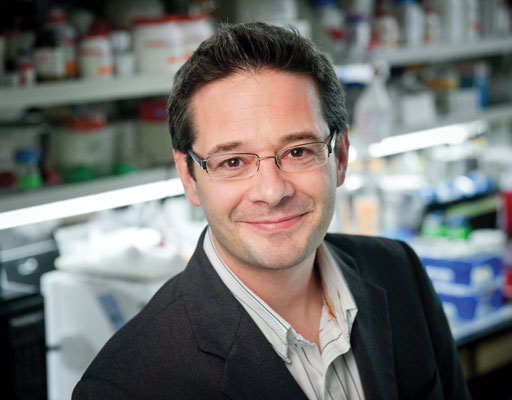Category: Research
-

A research round-up from Dr Paul Brennan at the University of Edinburgh
Dr Paul Brennan, from the University of Edinburgh, shares a round-up of his research with us.
-

We are hosting the biobanking workshop initiative in London today
The Biobanking Consensus Meeting, initiated by us, is being held at Islington’s Business Design Centre in London.
-

Canadian researchers discover cell subgroups in treatment of paediatric ATRT brain cancer
Researchers from Toronto and Montreal have successfully identified three distinct sub-groups of classification of the incurable typical teratoid rhabdoid tumours (ATRTs).
-

We are proud to announce the formation of our Scientific Advisory Boards
In order to ensure that we fund only the highest quality research, we have formed two Scientific Advisory Boards (SABs) which are made up of internationally renowned scientific and medical experts that work in different areas of cancer research and social science.
-

New biomarker could improve the diagnosis of diffuse gliomas
Researchers at the University of Texas Southwestern Medical Center in Dallas have identified a gene called SHOX2 that could be used to better diagnose brain tumours.
-

Why we’re investing in new brain tumour fund
“We will always do things differently if it’s the right thing for people affected by a brain tumour. That’s why we’re investing in The Brain Tumour Fund.” – Sarah Lindsell, CEO of The Brain Tumour Charity
-

Edinburgh research discovers new relationship between immune and glioblastoma cells
Research carried out at the University of Edinburgh has revealed a new alliance between immune cells and glioblastoma tumour cells in zebrafish.
-

New device ‘extends survival’ for glioblastoma patients, trial finds
A battery-powered cap that disrupts the growth of brain tumour cells could help glioblastoma patients to survive for longer, new findings suggest.
-

Cancer Moonshot 2020 launches brain tumour genome project
The Paediatric Brain Tumor Atlas Project has been launched by Cancer MoonShot 2020.
-

Q&A with Dr Paul Brennan
We caught up with Dr Paul Brennan from the University of Edinburgh to hear more about his research.
-

Scotland sees installation of cutting-edge MRI technology
The new Seimens Magnetom Terra 7 Tesla MRI machine is being installed in Glasgow in March 2017.
-

Q&A with Professor Richard Gilbertson
Professor Richard Gilbertson, tells us about his move to The Cambridge Cancer Centre and his plans for the future of brain tumour research
-

First stage of Addenbrooke’s trials of glioblastoma ‘pink drink’ research nears completion
Dr Colin Watts’ research, funded by us, uses fluorescent dye to reveal different parts of glioblastoma tumours during surgery.
-

Unique opportunity for surgery patients to help decode brain tumours
Researchers want to gather tissue samples from people with high-grade brain tumours as part of the groundbreaking Genomics England programme.
-

Brain tumour surgery: experts call for change to improve survival
New research prompts drive to increase specialist neurosurgery access
-

Charity Investment in Research: AMRC Findings
The latest report from the Association of Medical Research Charities (AMRC) shows that we’re part of an annual investment worth more than £1 billion each year amounting to over 40% of all publically-funded medical research.
-

Hope for Ollie following fundraising campaign
12-year-old Ollie Gardiner is set to become one of the first patients in the world to receive a treatment being trialled for childhood brain tumour patients after an astonishing fundraising campaign launched by his family.
-

US doctors test new glioblastoma drug treatment
US doctors are testing a new glioblastoma drug treatment with early results looking positive.
-

Microsoft’s cancer defeating plans with ‘smart’ molecular systems
Microsoft has vowed to “solve the problem of cancer” within a decade by using ground-breaking computer science.
-

New report shows that paediatric brain cancer now more deadly than childhood leukemia in the US
Brain cancer has surpassed leukemia as the deadliest cancer for children and teens in the United States, according to new government data reports the CNN news channel.
-

London sees the opening of Europe’s biggest biomedical laboratory
The Francis Crick Institute has just opened next to St Pancras station and the British Library.
-

President Obama appoints world-renown brain tumour professor to US National Cancer Advisory Board
Dr Francis Ali-Osman has been appointed to advise the Government on a wide range of issues relating to the US national cancer programme.
-

Google’s DeepMind AI division to analyse brain tumour scans
The Artificial Intelligence (AI) division of Google based in London, DeepMind, will attempt to differentiate between healthy and cancerous tissue by analysing 700 CT and MRI scans from former University College London patients.
-

UK firm and King’s College London behind new robot-assisted brain surgery
Stroud-based manufacturing company Renishaw, have installed revolutionary technology at King’s College London that dramatically improves accuracy and patient outcomes.